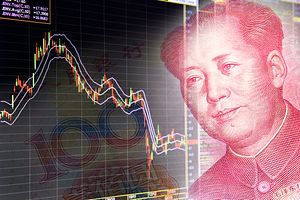China halted trading on its stock markets on Monday, after a 7 percent drop in the CSI 300 index triggered the new “circuit-breaker” mechanism. The first trading day of 2016 was the worst start to a year for Chinese stock markets, according to Bloomberg.
The circuit-breaker mechanism was unveiled in September, after a nearly 40 percent stock market slump over the summer. The mechanism was designed to keep the market from moving too far in one direction on any given day. If the CSI 300 index, which reflects the performance of 300 stocks traded on the Shanghai and Shenzhen markets, drops or rises 5 percent, the circuit-breaker kicks in to suspend trading for 15 minutes. If the index rises or falls by 7 percent in one day, trading is suspended. The mechanism took effect with the start of the new year, meaning it was brought into use on its first day in action.
On Monday, the index dropped 5 percent and trading was suspended at 1:12 pm local time, according to Xinhua. As soon as trading resumed, the index slumped again, hitting the 7 percent mark and triggering the automatic suspension at 1:33 pm, around seven minutes after trading resumed. The rapid drop after trading was reinstated prompted some analysts (including Bob Pisani of CNBC) to suggest that the circuit breaker mechanism itself was part of the problem.
The dip in Chinese stocks on Monday follows the release of weak manufacturing numbers for December 2015. However, some analysts said the sell-off may also be due to investor worries about the fate of the market once a six-month ban on major shareholders selling their stock expires. The ban, put in place by the China Securities Regulatory Commission on July 8, prohibits corporate executives and investors holding more than 5 percent shares in a company from selling their stock. Like the circuit breaker mechanism, the ban was intended to stabilize markets in the wake of the summer rout, but seems to be having unintended consequences.
Xinhua tried to remain upbeat, quoting a Chinese analyst who called the dip on Monday part of “ordinary, healthy and rational corrections.” But global traders weren’t so optimistic, with markets from Asia, Europe, and the United States all dropping.
As Dingding Chen wrote for The Diplomat during China’s summer market slump, the stock market woes point to a larger debate in China about the purpose of the market in general, and the role the government should play in it. If Monday’s drop is any indication, that will continue to be a hotly debated point in 2016 as well.

































